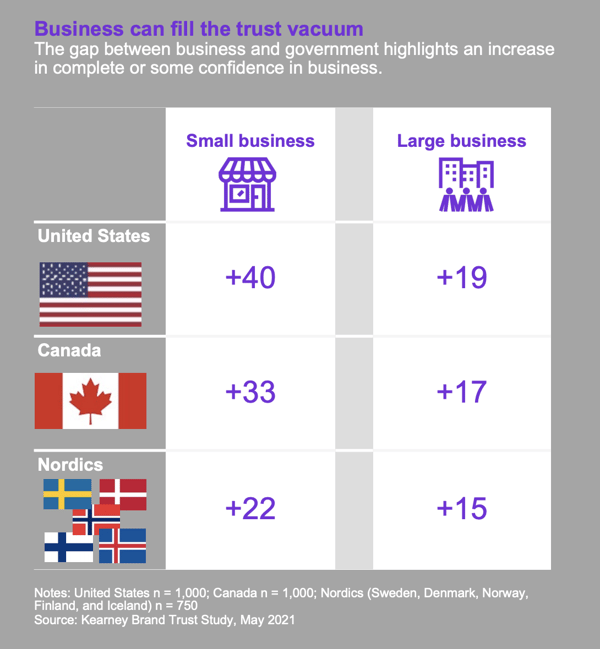Who do you trust more: the government or a large corporation? If you’re anything like the average American, the answer is probably the latter.
It wasn't always this way. In the '70s and '80s, fictional companies like the Soylent Corporation and Alien's Weyland-Yutani played off public fears of corporate America's dark machinations in Hollywood movies.
Today, though, Americans don't need to go to the movies to encounter such outlandish plots and conspiracy theories. They are front and center in our politics, media coverage and public discourse.
By comparison, big corporations don't seem so bad after all.
Brand Trust vs. Institutional Trust
As the government, media and even churches have gotten sucked into America's corrosive, post-truth culture wars, the country's business community—and especially small businesses—have to date come out relatively unscathed. And that presents an opportunity for brands to build even stronger relationships with consumers.
So says the Kearney Consumer Institute in its Q2 Study, "Have a Little Faith in Me: The Truth About Consumer Trust." Among its findings, the study revealed a 19-point gap between Americans' trust in large businesses compared with the government and 40-point gap in favor of small businesses. These findings were echoed in other countries, although not as pronounced.

Concludes Kearney:
Brands can take advantage of this “institutional trust” deficit—defined as the faith consumers have, or don’t have, in institutions to fill a role in their lives that they cannot fill themselves and to act as their agent in resolving things they can’t solve on their own.
This recommendation for brand trust to pick up the slack for institutional trust is similar to the one Edelman has put forward in its Edelman Trust Barometer reports.
The Benefits of Closer Relationships
It's important to note that, across multiple surveys, small businesses fare better than large ones in the eyes of consumers. Data shows this is because the public views small businesses as playing an important role in their local communities, and as having more transparent business practices.
But big brands can also build closer relationships with their communities when consumers view them as operating honestly and authentically, and contributing to the greater good of society. This explains the increasing emphasis on social purpose for many brands.
But, as Kearney's research also shows, brands must first get the basics right, including creating high-quality products, delivering on promises and providing excellent customer service. Brands may also pay a high price for failing to nurture and protect the trust they are given, as the Big 5 tech companies have learned the hard way.
Kearney's Katie Thomas describes the opportunity this way: “Brands have gotten more and more in tune to their customer, how they live and their lifestyles. They can fill the role of trusted advisor in specific niches. They’re listening to consumers in a way that other institutions aren’t as much anymore."
The potential benefits to filling the trust void with consumers are significant, Thomas says. This includes earning greater customer loyalty and having a stronger foundation for creating brand extensions and evolving into new categories.
Leave a Comment